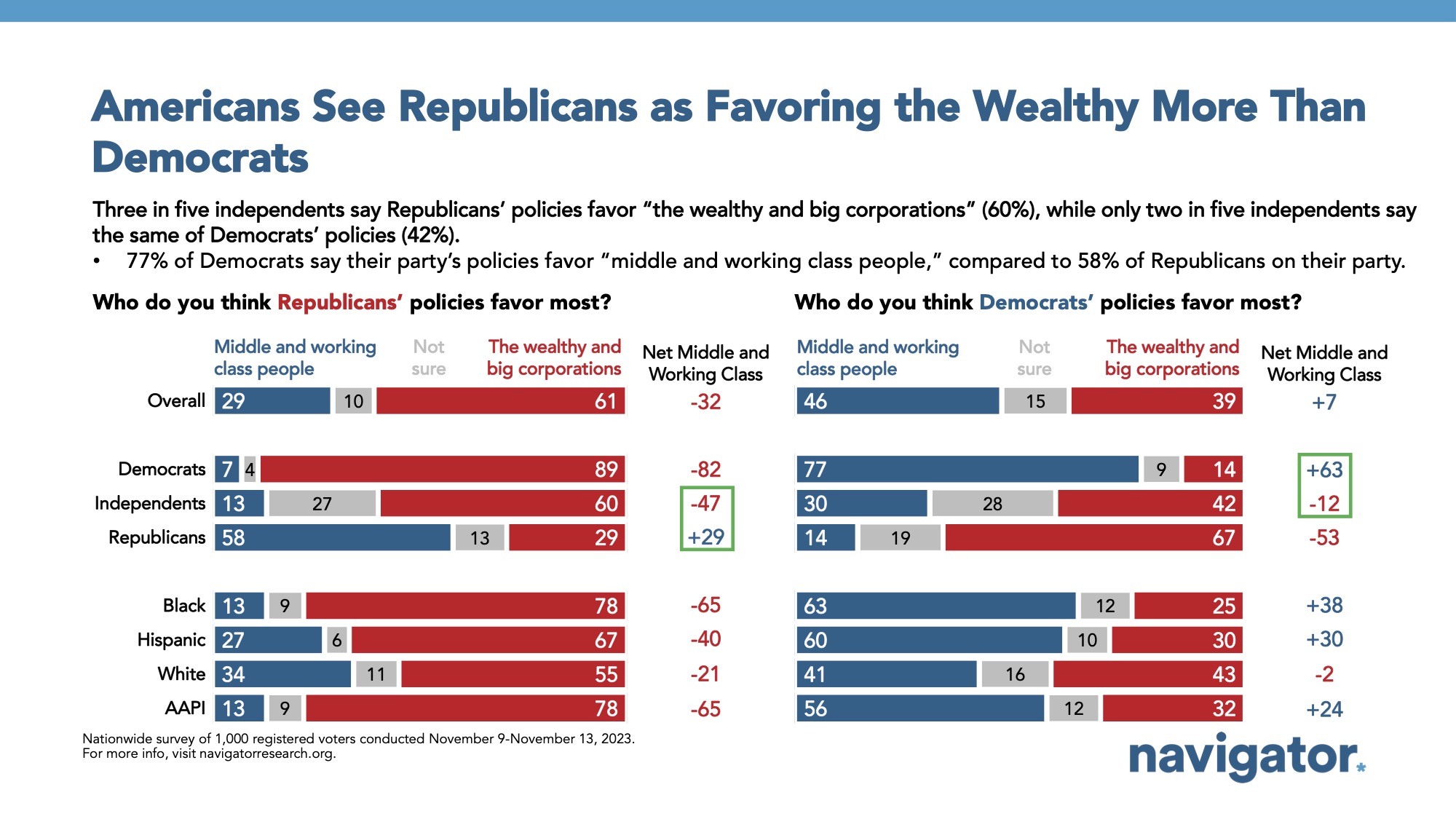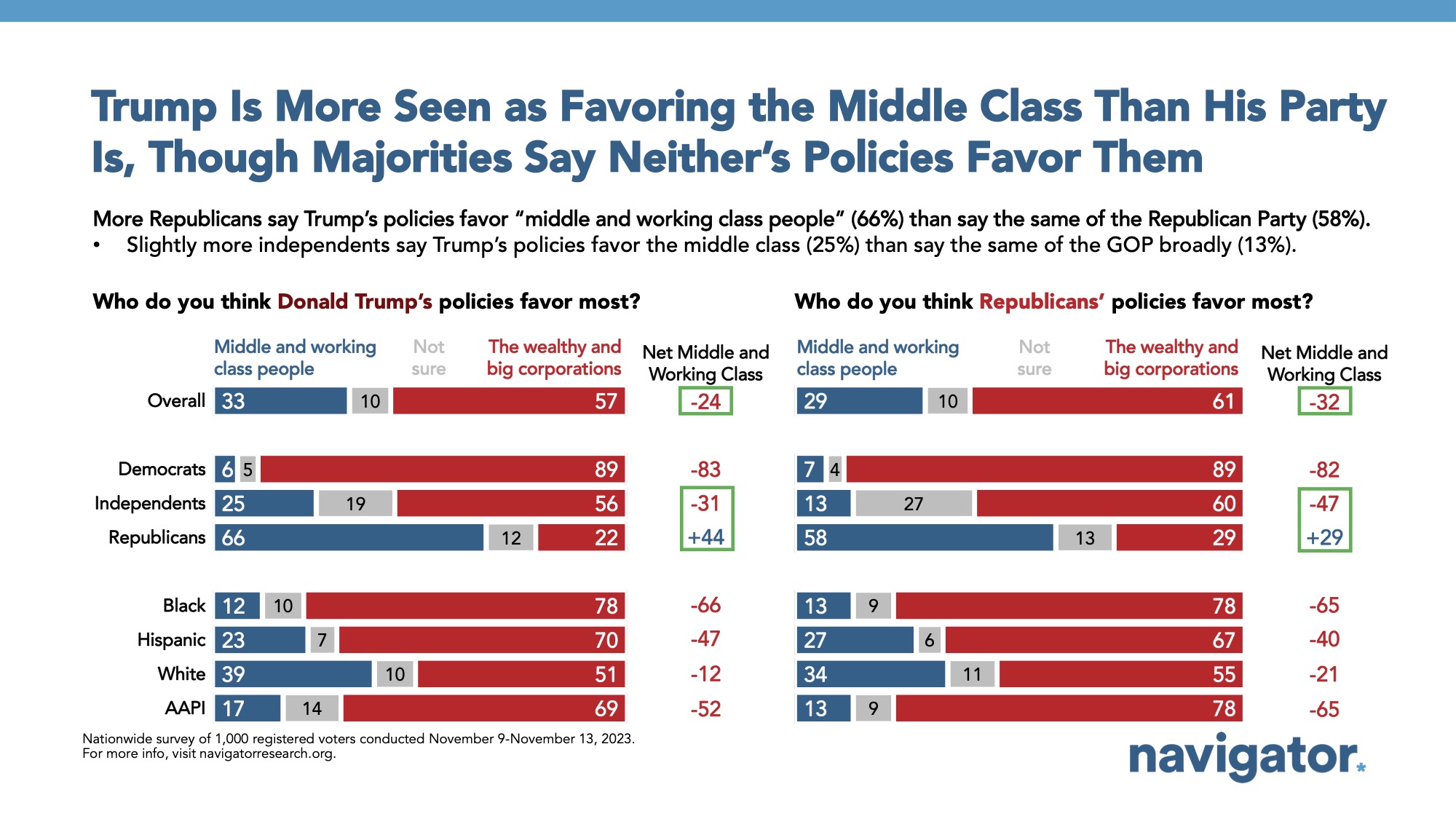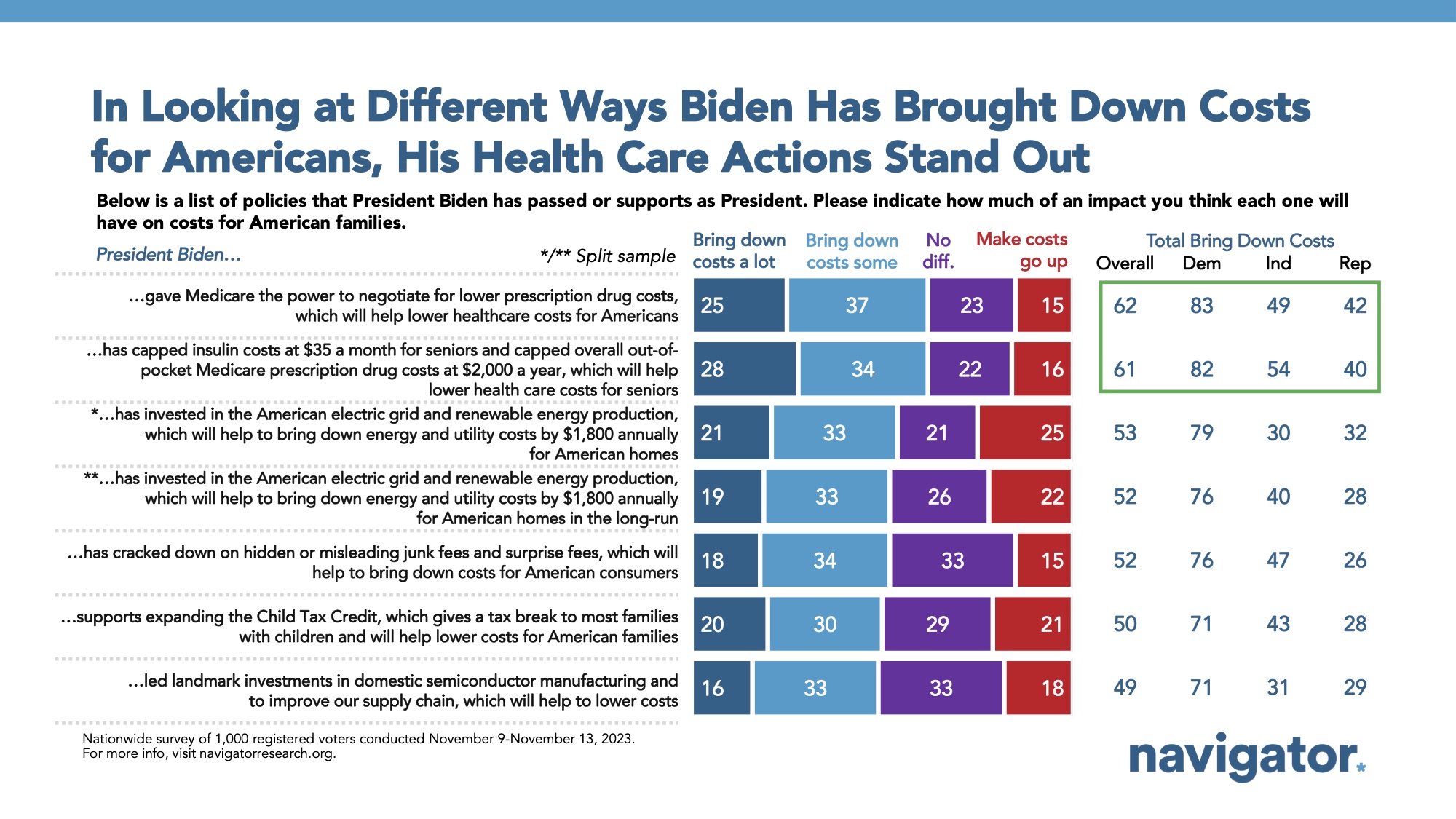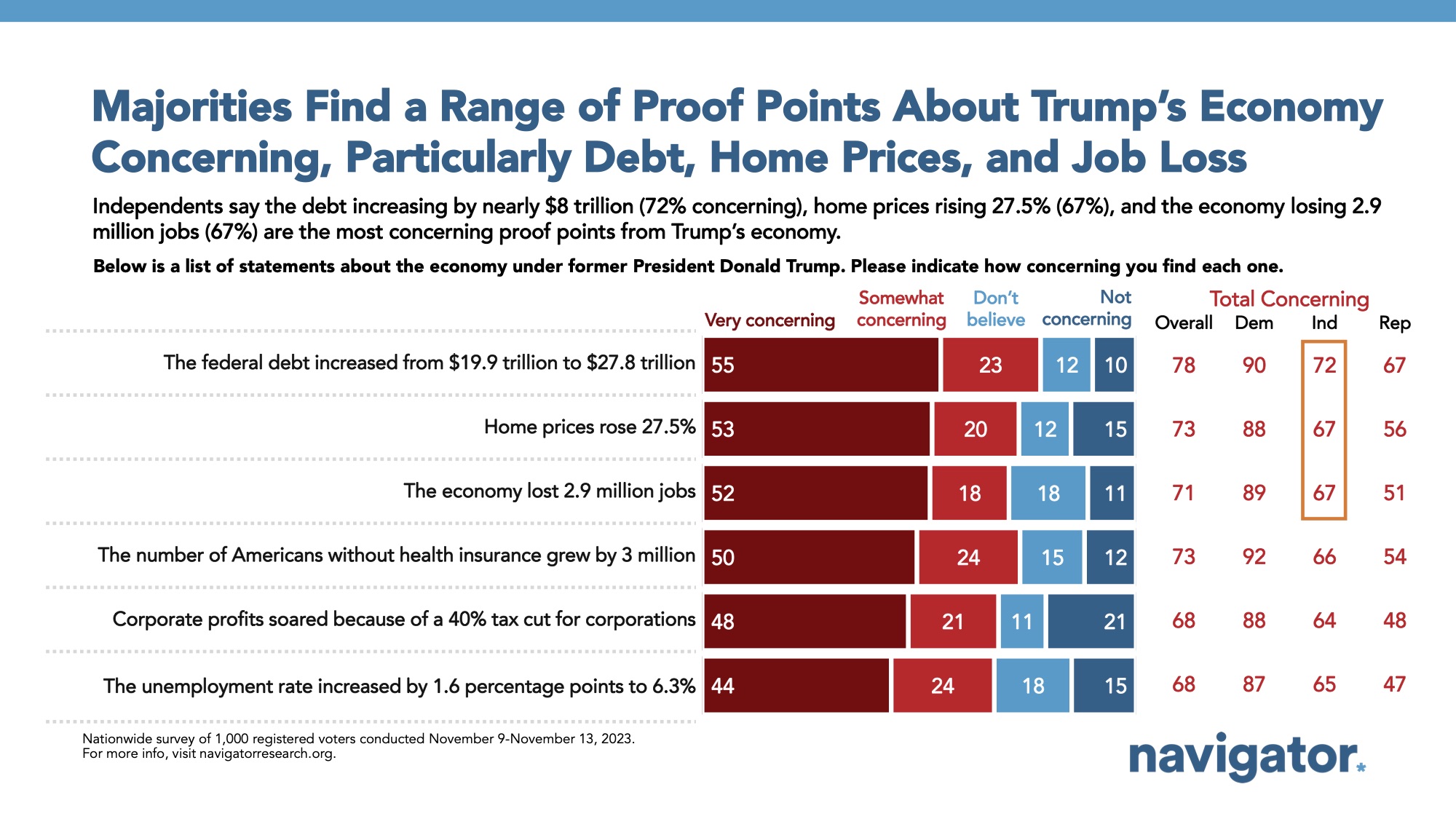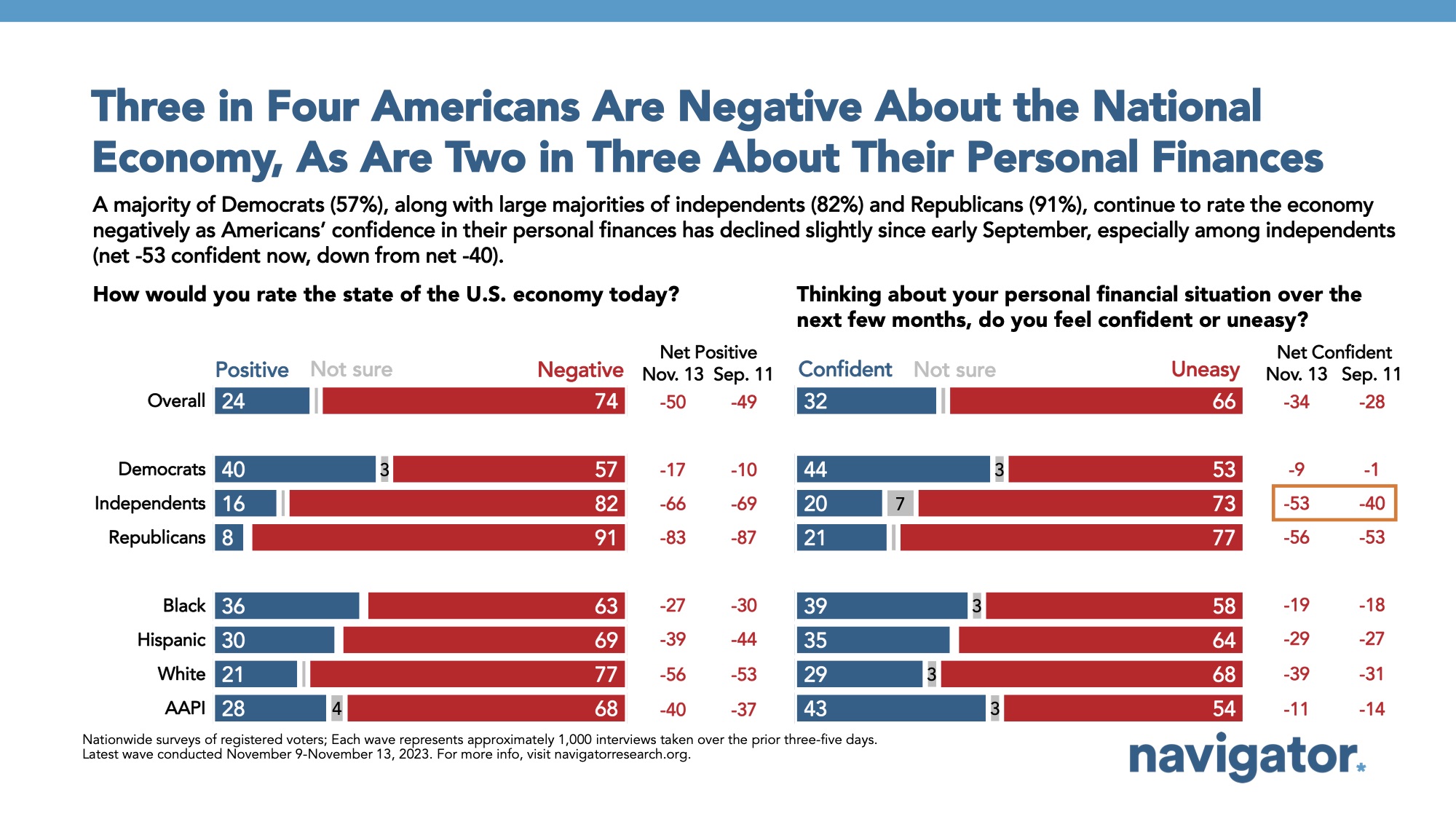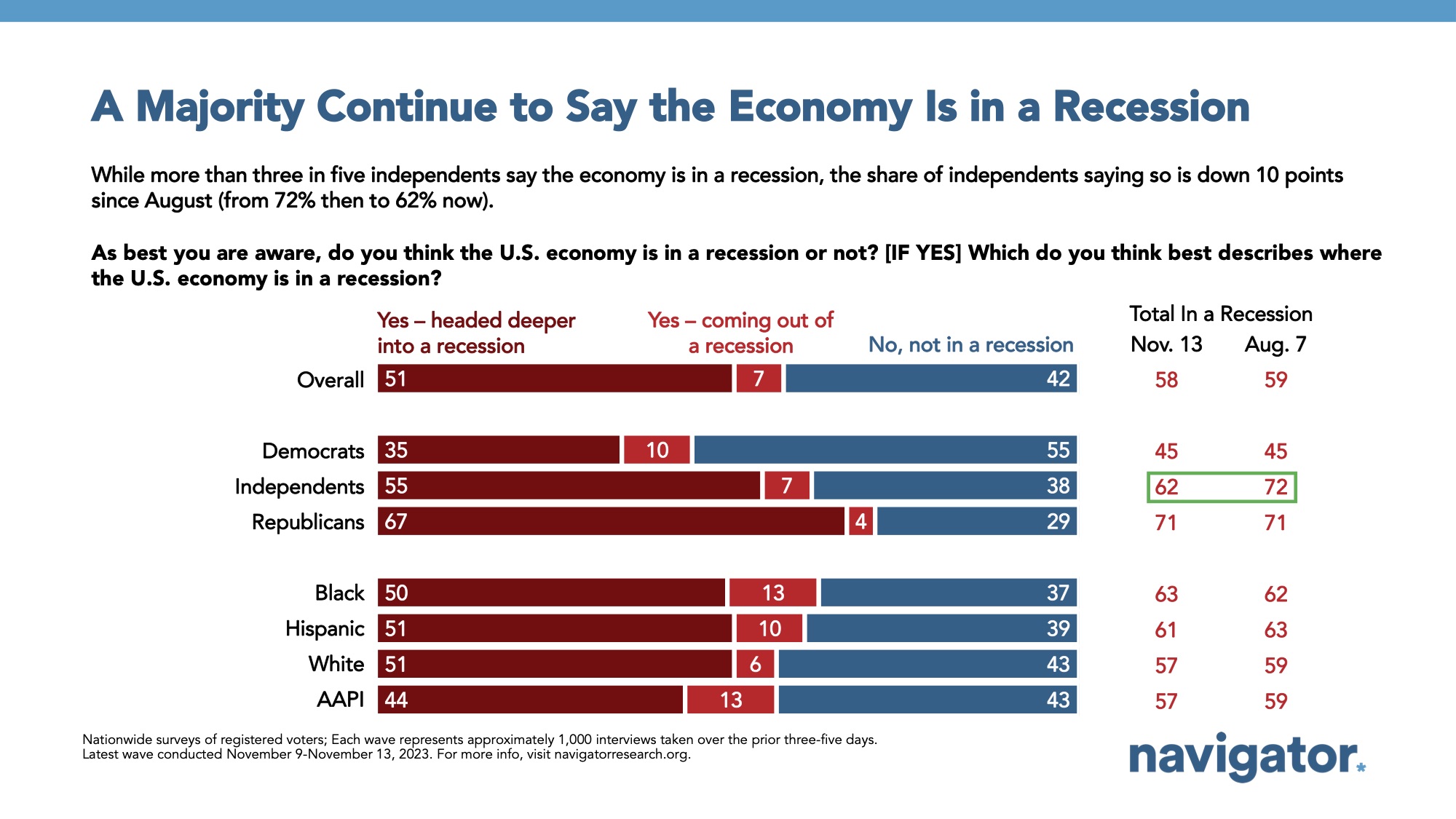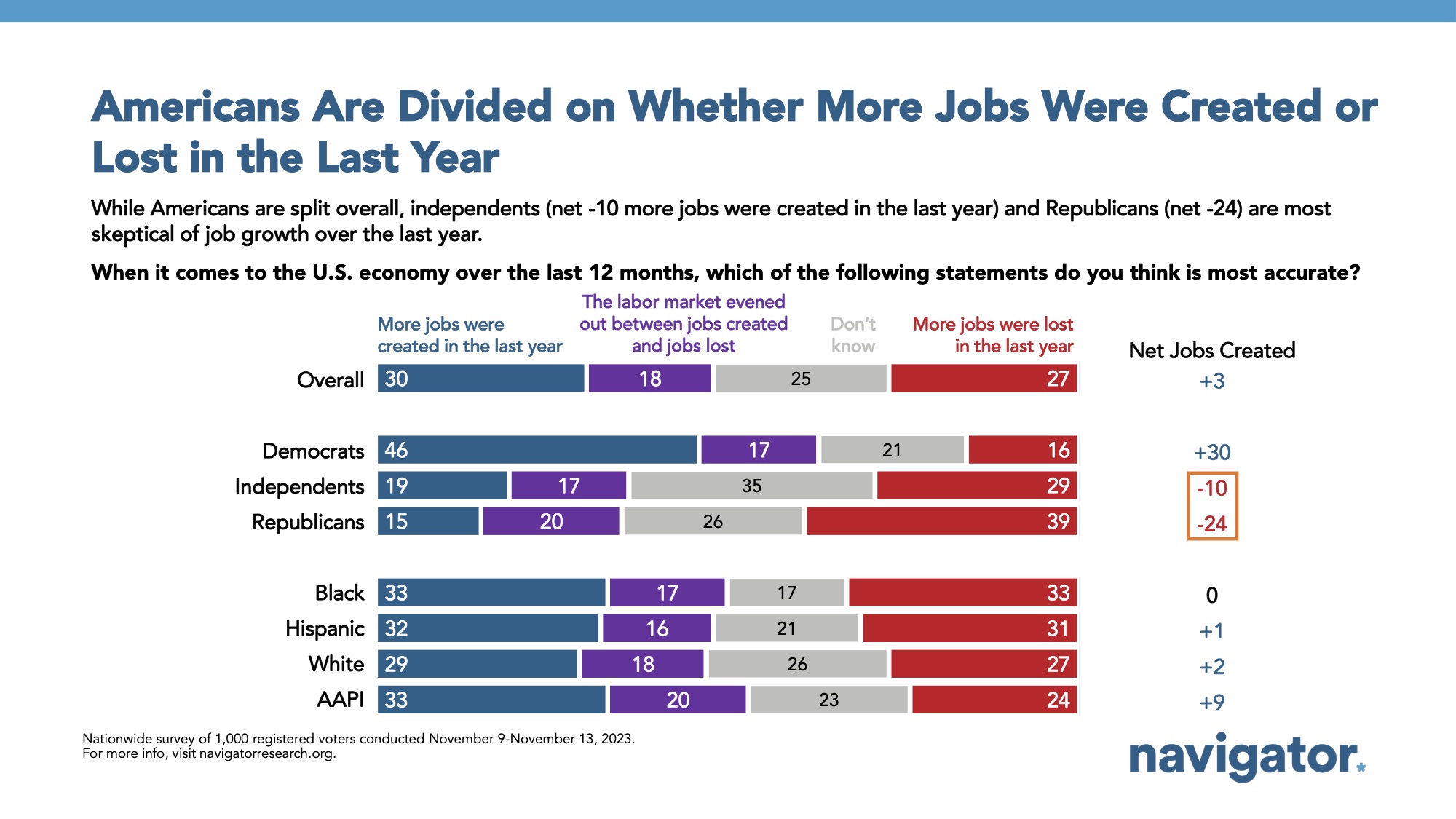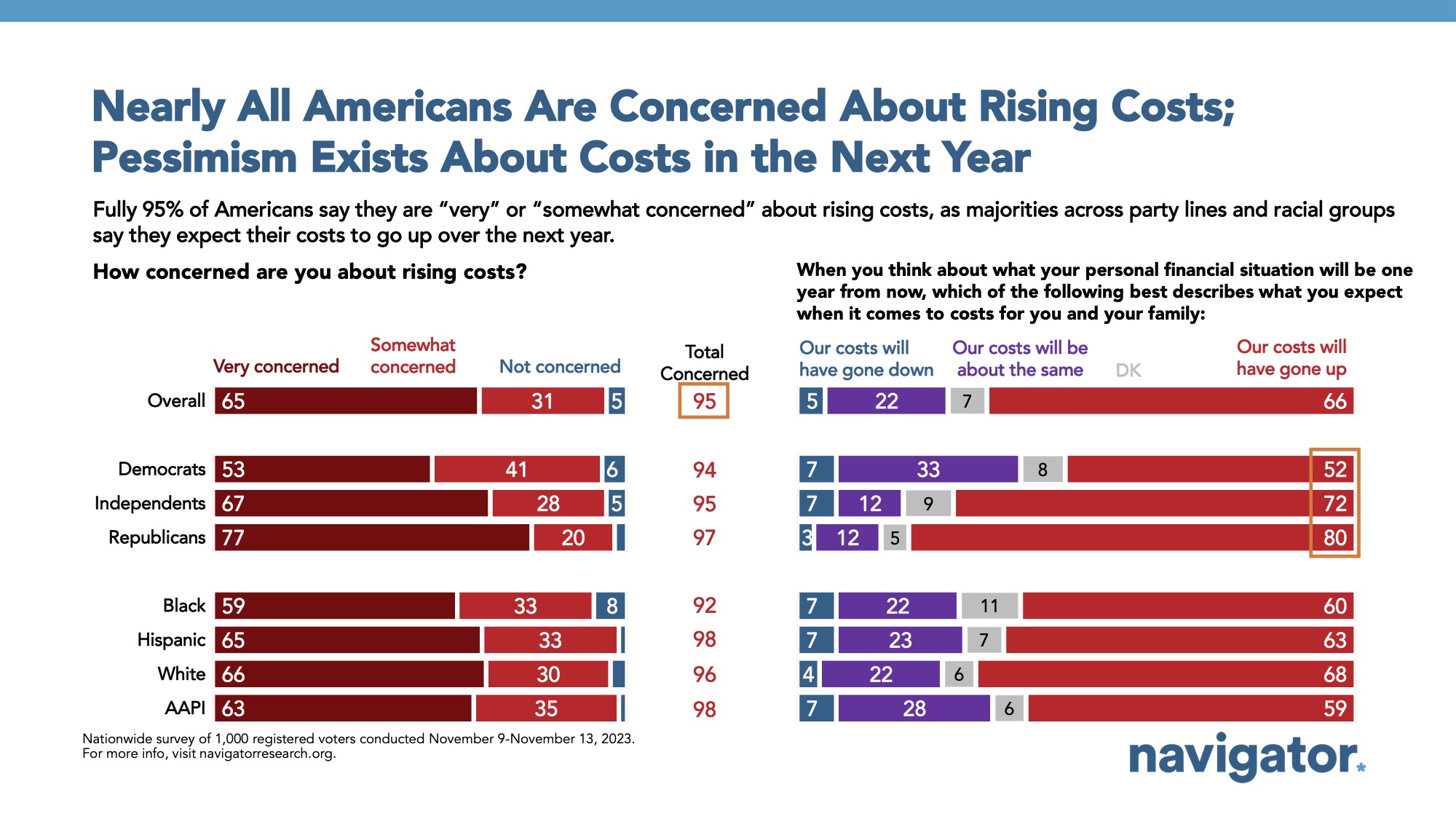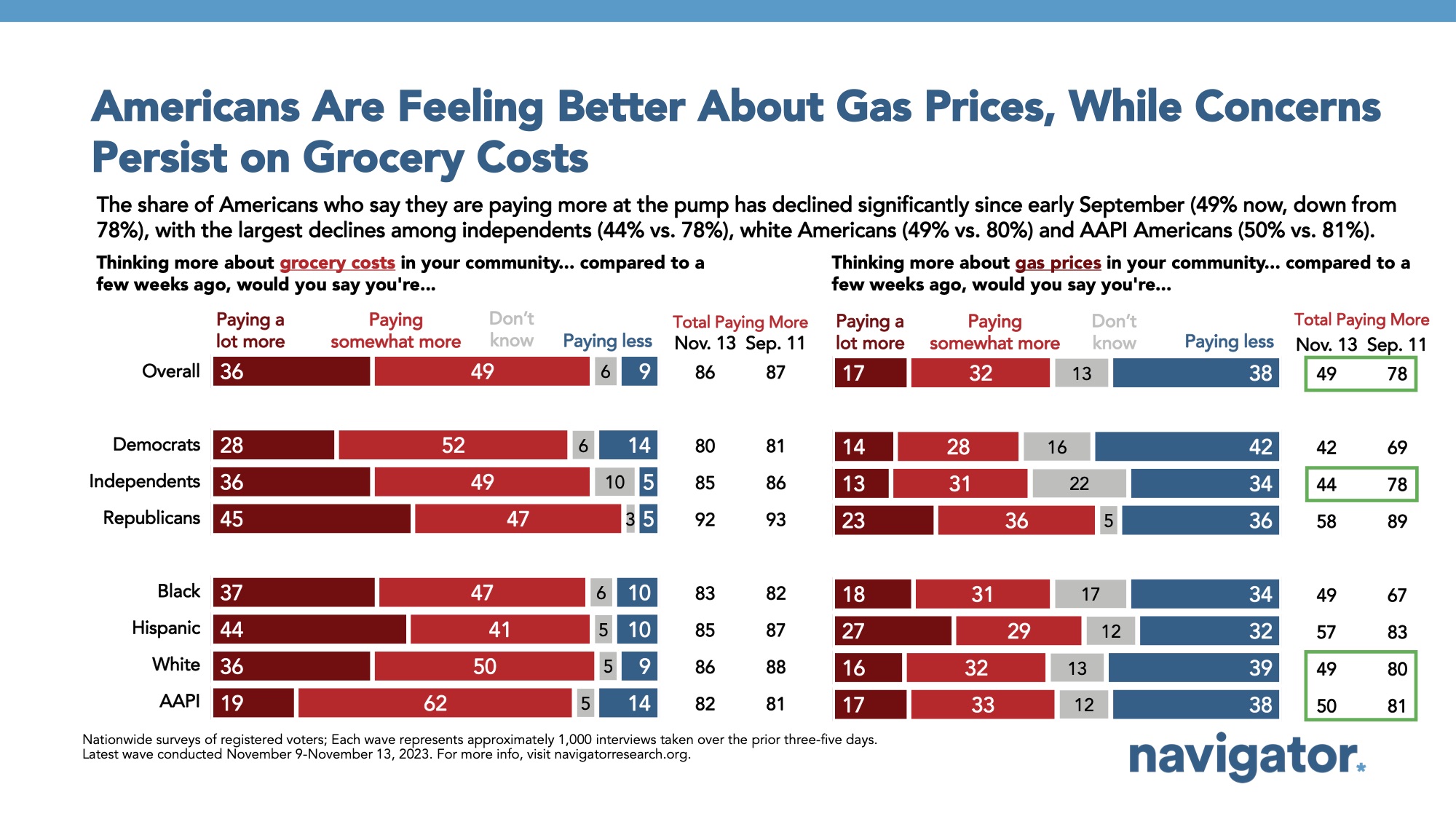Poll: Cost of Living and Trump vs. Biden
This Navigator Research report contains polling data on Americans’ perceptions about the state of the economy, including the share who believe we are in a recession, perceptions of the political parties and their leaders on who their economic policies are helping, and evaluations of of both President Biden and former President Trump’s records on the economy.
A plurality think Democrats’ policies favor the middle and working class more.
Three in five Americans and independents believe Republican policies most favor the wealthy and big corporations over the middle class and working people, while a plurality saying Democrats’ policies favor the middle class and working people more. By a 32-point margin, Americans feel Republican policies favor the wealthy over the middle and working class (61 percent favor the wealthy and big corporations – 29 percent favor the middle and working class), including an overwhelming majority of independents (60 percent favor the wealthy and big corporations – 13 percent favor middle and working class people) and those living in households earning less than $50,000 per year (62 percent favor the wealthy and big corporations – 29 percent favor middle and working class people). Conversely, a plurality of Americans feel Democrats’ policies favor the middle and working class more (46 percent) than the wealthy and big corporations (39 percent).
- Americans are roughly split between believing that President Biden’s policies favor the middle and working class more (42 percent) than the wealthy and big corporations. But by a wide margin, a majority of Americans feel Trump’s policies favor the wealthy and big corporations more (57 percent favor the wealthy and big corporations – 33 percent favor middle and working class people), though this is a net 8 points lower than perceptions of the Republican Party overall. A significant share of Americans living in households earning less than $50,000 per year believe Trump’s policies favor the wealthy and big corporations more (58 percent favor the wealthy and big corporations – 31 percent favor middle and working class people).
President Biden’s reforms to lower prescription drug and insulin costs are seen as the most impactful cost reductions.
Majorities say Biden’s policies of giving Medicare the power to negotiate lower drug prices, capping insulin costs at $35 per month, and investing in infrastructure will bring down costs. 62 percent of Americans feel that Biden giving Medicare the power to negotiate for lower prescription drug prices will bring down costs. Other Biden policies Americans think will lower costs include:
- Capping insulin costs at $35 per month for seniors and capping overall out-of-pocket Medicare prescription drug costs at $2,000 per year (61 percent believe this will bring down costs);
- Investment in the American electrical grid and renewable energy production, which will help bring down energy and utility costs by $1,800 annually for American homes (53 percent believe this will bring down costs);
- Biden cracking down on hidden or misleading junk fees and surprise fees (52 percent believe this will bring down costs); and,
- Biden’s support for the child tax credit which gives a tax break to most families with children (50 percent believe this will bring down costs).
Large majorities are concerned by a range of proof points about Trump’s economy.
A vast majority find a number of impacts from Trump’s first term as president to be concerning, including the massive increase of the national debt during his presidency, skyrocketing home prices, and nearly 3 million jobs that were lost. 78 percent of Americans find it concerning that the federal deficit increased from $19.9 trillion to $27.8 trillion under Trump, including 55 percent who find this “very” concerning. Other concerning economic proof points under Trump include home prices rising 27.5 percent (73 percent concerning), the number of Americans without health insurance growing by 3 million (73 percent concerning), the economy losing 2.9 million jobs (71 percent concerning), the soaring of corporate profits caused by a 40 percent tax cut on corporations (68 percent concerning), and the unemployment rate increasing by 1.6 percentage points to 6.3 percent overall (68 percent concerning).
Three in four Americans rate the economy negatively, as a majority feel the economy is in a recession and headed into a deeper recession.
74 percent of Americans currently rate the economy as either “not so good” or “poor,” and 58 percent feel the economy is getting worse. A majority feel the U.S economy is in a recession (58 percent), including 51 percent feeling that we are headed into a deeper recession and 7 percent who think we are coming out of a recession. This comes as two in three Americans are feeling uneasy about the outlook of their personal financial situations over the next few months (66 percent), with greater levels of uneasiness among those who work in the service industry (78 percent) and those living in households earning less than $50,000 per year (72 percent).
- Despite increased job creation and a low 3.9 percent unemployment rate, Americans are split on whether more jobs were created or more jobs were lost last year (30 percent more jobs created – 27 percent more jobs lost, with 25 percent of Americans who are unsure). By 24 points, Republicans are more likely to believe fewer jobs have been created in the last year (15 percent more jobs created – 39 percent more jobs lost), as are independents by 10 points (19 percent more jobs created – 29 percent more jobs lost). Democrats believe there has been job growth over the last year by 30 points (46 percent more jobs created – 16 percent more jobs lost).
Nearly all Americans are concerned about rising costs, as two in three feel costs will continue to rise heading into next year.
51 percent of Americans say inflation should be the primary issue for Congress to focus on followed by jobs and the economy (41 percent). Moreover, 95 percent of Americans are concerned about rising costs, including 65 percent who are “very” concerned. Nearly nine in ten feel they are paying more for groceries than they were a few weeks ago (86 percent), with one in three who feel they are paying “a lot” more (36 percent). However, there is an increasing perception that gas prices are easing: about half feel they are paying more for gas in their community than they were a few weeks ago (49 percent), a significant decline compared to early September where nearly four in five felt they were paying more for gas over the preceding few weeks (78 percent).
- Two in three Amerians feel that costs for themselves and their families will have gone up a year from now (66 percent), compared to one in five who feel costs will be about the same (22 percent) and just 5 percent who feel costs will have gone down.
About The Study
Global Strategy Group conducted public opinion surveys among a sample of 1,000 registered voters from November 9-November 13, 2023. 105 additional interviews were conducted among Hispanic voters. 72 additional interviews were conducted among Asian American and Pacific Islander voters. 100 additional interviews were conducted among African American voters. 103 additional interviews were conducted among independent voters. The survey was conducted online, recruiting respondents from an opt-in online panel vendor. Respondents were verified against a voter file and special care was taken to ensure the demographic composition of our sample matched that of the national registered voter population across a variety of demographic variables.

